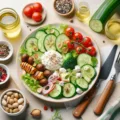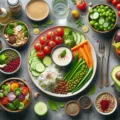Are you looking to build muscle, lose weight, or simply maintain a healthy diet? A high protein meal plan can help you achieve your goals. In this 7-day meal plan, we’ll provide you with delicious, nutritious, and easy-to-prepare meal ideas that are rich in protein.
Why Choose a High Protein Diet?
Protein is an essential macronutrient that plays a crucial role in building and repairing tissues, producing enzymes and hormones, and supporting overall health. A high protein diet can help you:
- Build and maintain muscle mass
- Reduce appetite and hunger levels
- Boost metabolism and increase fat burning
- Improve bone health
- Support healthy aging
7-Day High Protein Meal Plan
Here’s a detailed 7-day high protein meal plan to get you started. Each day includes breakfast, lunch, dinner, and snacks, all focused on maximizing protein intake.
Day 1
- Breakfast: Greek yogurt with mixed berries and a sprinkle of chia seeds
- Lunch: Grilled chicken salad with quinoa, avocado, and mixed greens
- Dinner: Baked salmon with roasted vegetables and a side of brown rice
- Snack: Cottage cheese with pineapple
Day 2
- Breakfast: Scrambled eggs with spinach and feta cheese
- Lunch: Turkey and avocado wrap with a side of baby carrots
- Dinner: Beef stir-fry with broccoli, bell peppers, and snap peas over quinoa
- Snack: Protein shake with almond milk
Day 3
- Breakfast: Overnight oats with protein powder, banana, and almond butter
- Lunch: Tuna salad with mixed greens, cherry tomatoes, and cucumbers
- Dinner: Grilled shrimp with garlic and lemon, served with asparagus and wild rice
- Snack: Hard-boiled eggs
Day 4
- Breakfast: Protein pancakes topped with fresh strawberries
- Lunch: Lentil soup with a side of whole-grain bread
- Dinner: Baked chicken breast with sweet potato and steamed broccoli
- Snack: Edamame
Day 5
- Breakfast: Smoothie bowl with protein powder, spinach, and mixed fruits
- Lunch: Chickpea and avocado salad with cherry tomatoes and red onion
- Dinner: Pork tenderloin with sautéed green beans and mashed cauliflower
- Snack: Greek yogurt with honey
Day 6
- Breakfast: Cottage cheese with sliced peaches and a sprinkle of cinnamon
- Lunch: Grilled tofu and vegetable skewers with a side of quinoa
- Dinner: Lamb chops with roasted Brussels sprouts and a baked potato
- Snack: Almonds and dried cranberries
Day 7
- Breakfast: Egg and vegetable frittata
- Lunch: Shrimp and avocado salad with mixed greens and lemon vinaigrette
- Dinner: Grilled cod with a side of lentils and steamed green beans
- Snack: Protein bar
Tips for Success
To make the most of your high protein meal plan, consider these tips:
- Plan your meals ahead of time to ensure you have all the necessary ingredients.
- Incorporate a variety of protein sources to get a wide range of nutrients.
- Stay hydrated by drinking plenty of water throughout the day.
- Listen to your body and adjust portion sizes based on your hunger and activity level.
- Combine your diet with regular exercise for optimal results.
FAQ
1. What are the best sources of protein?
Some of the best sources of protein include lean meats (chicken, turkey, beef), fish, eggs, dairy products (Greek yogurt, cottage cheese), legumes (beans, lentils), nuts, seeds, and plant-based proteins (tofu, tempeh).
2. How much protein do I need per day?
The recommended daily intake of protein varies based on factors such as age, sex, and activity level. Generally, it’s suggested that adults consume 0.8 grams of protein per kilogram of body weight. Athletes and those looking to build muscle may require more.
3. Can I follow a high protein diet if I’m vegetarian or vegan?
Yes, vegetarians and vegans can follow a high protein diet by focusing on plant-based protein sources such as beans, lentils, tofu, tempeh, quinoa, nuts, seeds, and protein-rich grains.
4. What are the benefits of a high protein breakfast?
A high protein breakfast can help you feel fuller for longer, reduce cravings throughout the day, and provide the energy needed to start your day off right. It can also support muscle repair and growth, especially if consumed after morning exercise.
5. Are there any risks associated with a high protein diet?
While a high protein diet can offer many benefits, it’s important to balance it with other nutrients. Excessive protein intake can strain the kidneys and liver, especially in individuals with pre-existing conditions. It’s always best to consult with a healthcare provider before making significant dietary changes.









